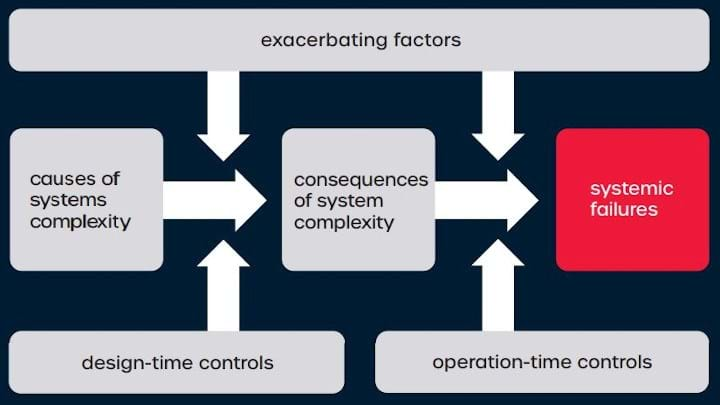Engineering X outlines strategy for the profession to lead on safety in complex systems

FACED with an increasingly complex and interconnected world, the Royal Academy of Engineering (RAEng) wants to cement the engineering profession as recognised leaders on safety in complex systems, which can support other professions and help shape the global agenda.
Engineering X, a partnership between RAEng and Lloyd’s Register that brings together experts to help address the greatest challenges of our time, has published a strategy and sponsored a series of case studies to better understand complex systems and how to manage them. It has called for changes to engineering education and professional development, and the development of new tools and a shared language to help disciplines better manage safety.
“Complex systems are many and varied, growing in number and impacting our lives daily, often in ways we don’t realise,” said Roger Kemp, who leads the Engineering X Safer Complex Systems advisory group.
“Some complex systems are engineered – such as a city metro system – there is a plan, the participants are known in advance, and there are protocols and regulations in place. There is little ambiguity over its geographical extent, assets, operations or responsibility for the safety of the network. Other complex systems can be ad hoc – with no central authority, players joining and leaving at will, and regulation covered by multiple jurisdictions.”
“Often people find themselves in a complex system-of-systems that, until one system fails and there is a cascading effect on lots of other systems, no-one had previously thought of as being interconnected, and the development of appropriate oversight and governance is not keeping up with the pace of change.”
Kemp pointed to Storm Desmond which struck the UK in 2015. The resulting loss of power knocked out phone networks and ATM machines, and left petrol pumps inoperable.
Dame Judith Hackitt, Chair of Engineering X Safer Complex Systems, said: “The increasing complexity and interconnectedness of the world we live in has made us all more vulnerable to systemic shocks like the current Covid-19 pandemic. We need to ask ourselves three questions: How can we manage complexity more effectively? How can we find ways to simplify and share knowledge and good practice? And how do we raise awareness and increase competency across engineering disciplines and beyond?”
Chairing a virtual briefing on the programme, Dame Judith said it is not exclusively about systems engineering. “This is about complex systems that involve many different disciplines. Not all of those disciplines are technical. Some of them are human systems, they are social systems, they can be regulatory systems, and many more.”
Looking back, looking ahead
The programme’s origins lie in a report commissioned in 2018 by Lloyd’s Register Foundation (LRF) on global safety challenges that highlighted the risks of complex systems failing. The RAEng and LRF founded the Engineering X Safer Complex Systems programme in 2019. What followed were workshops and a study by the University of York that led to recommendations on how to support society to better manage complexity and an initial framework (pictured below) to help those in different sectors and disciplines analyse systemic failure and manage complexity safely.

Recommendations from the programme have included that the Engineering Council and professional engineering institutions (PEIs) consider how competencies for chartered status take account of cross-disciplinary working, systems thinking and engineering ethics. There’s also the need for outcomes-based regulation and research into how rare, high-consequence events impose risks on engineered structures.
Having gathered evidence and built a core community, the programme is now moving into a “build phase” that will run to 2023. It has identified four key areas to address: education, governance, advocacy, and building a diverse community.
Education requires a radical rethink
On education, the strategy says that engineering education needs overhauling so that engineers have the competencies to understand and manage issues arising from complexity.
Dame Judith said: “We believe that means we need a radical rethink of what is and is not in an engineer’s education, and we need to better understand how we train our engineers so that they have the necessary competencies to understand and manage issues arising out of complexity and to lead in delivering safety.”
The panellists of the virtual briefing were asked how engineering education should change. Kemp said that courses could introduce undergraduates to systems, explore how to define them and make them stable. He said while undergraduates need to understand the fundamentals, they could spend less time doing detailed calculations given the available software.
Danielle Antonellis, who is conducting a case study for Engineering X on how fire risks emerge in informal urban settlements, said: “In addition to thinking about systems thinking, we need to think about closing the gap between physical sciences and social and political sciences. I certainly didn’t have any social or political science courses when I was in engineering school and now I’ve learned a lot of it on my own. I wish I would have had it earlier. There’s certainly opportunities to bring disciplines closer together at an earlier stage, and education is a great opportunity for that.”
New tools
Dame Judith said: “As things become more difficult to predict and we can no longer base our understanding or approach to safety management on things that have already happened and which we can learn from, we know that we need to develop new tools because our existing tools may not be suited to the new context that we find ourselves working in. We believe we need to develop new safety management tools as well as continuing to use the old tools but recognising their limitations when dealing with new problems.”
Engineering X has commissioned 19 case studies into the successes and failures of complex systems to show what has been learned and anticipate what is needed to stay safe in the future. They cover a wide array of topics including the vulnerability of rural communities threatened by wildfire; resilience of humanitarian supply chain crashes affected by the pandemic; rail accidents in the UK; dam failure and flooding in Australia; and structural integrity in offshore energy infrastructure. They will test the applicability of the framework developed by the University of York and are due to be completed later this year. The case studies will be used to develop new educational tools to support the education and professional development of engineers in academia and industry.
Next steps
In its strategy, Engineering X outlined a number of issues to address. These include that the framework developed by the University of York lacks focus on those early planning stages ahead of design work where the seeds of problems can be sown. It also recognises that it would be useful to develop a shared “lexicon of safety” to help avoid confusion between those working in different sectors who use the same term for different things.
Looking towards its “lead phase” from 2023, the programme seeks to reach the point where the engineering profession leads in the prevention of systemic failure in engineered infrastructure systems and supports other professions to prevent systemic failure in non-engineered infrastructure systems globally.
It has called on interested people to join the effort and feed in to plans for future activities as it seeks to build a diverse international community.
For more information, visit: https://www.raeng.org.uk/global/international-partnerships/engineering-x/safer-complex-systems
Recent Editions
Catch up on the latest news, views and jobs from The Chemical Engineer. Below are the four latest issues. View a wider selection of the archive from within the Magazine section of this site.




